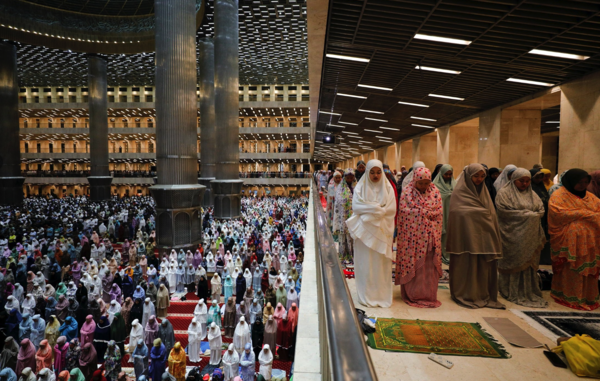Ramadan, the ninth month of the Islamic calendar, is the holy month of fasting, prayer, reflection and community. In this Spotlight, we explore how Ramadan is observed in our community and worldwide.
Ramadan is a month of fasting during the ninth month of the Hijri (lunar Islamic calendar) –– also known as the most sacred month in Islamic culture –– where Muslims around the world practice discipline and structure to strengthen their bond with Allah. The sighting of the new crescent moon, as determined by a moon sighting committee based in Saudi Arabia, signals the first day of Ramadan. This year, Ramadan began on the evening of March 22, and is to end on the evening of April 21 with the annual Eid al-Fitr, the three-day-long “festival of breaking the fast.”
The holy month is most commonly observed through daily practices such as Taraweeh prayers, Quran recitations, Suhoor (pre-dawn meal before the fast), and Iftar (meal that breaks the fast). In Islamic belief, it is believed to be a month that reinvigorates one’s spirituality by bringing attention to one’s agitations, fostering empathy for fellow Islam brothers and sisters, and purifying the soul from previous wrongdoings.

For the last few years, Ramadan celebrations had more or less been stunted due to the restrictions brought by the pandemic, where the communal practices that traditionally accompany Ramadan had to be replaced with isolated celebrations. This year, with most COVID restrictions on the release, mass celebrations of Ramadan have been ramping up, especially in countries with large Muslim populations. Aside from the common practices of worship and practice, Muslims around the world cherish their own cultural customs and traditions which differ by region. An example of a unique tradition is the “Padusan” — to bathe — in Indonesia, where Muslims wash themselves in rivers and lakes the day before the first day of Ramadan. Another instance of regional Ramadan traditions is Ramadan drummers in Türkiye, where musicians wander the streets playing the drums during sunrise to signal the start of Suhoor. There are also numerous customs surrounding the timing of the Iftar, like the firing of the Iftar cannon in Kuwait and regions having a chosen food or drink to break the fast with to begin the Iftar.
With most of the world’s 1.5 billion Muslims taking part, the month-long religious ritual of fasting has a significant economic impact, particularly on the food market. Contrary to what may be expected, food sales skyrocket, as the practice of eating becomes a ritual with larger significance. Food bills for the average Muslim household surge around 30% more than the rest of the year. Ramadan food retailers and other primary and secondary suppliers gear up stock at least a month ahead in order to support the excess demand during Ramadan, and many supermarkets and restaurants in Islamic countries extend their opening hours until midnight.
Unfortunately, the grandness of the celebrations tends to lead to a simultaneous increase in food waste. The UAE Ministry of Environment and Climate Change outlined that food waste doubles during Ramadan, and leads to an annual food waste worth approximately 4 billion USD. Considering that an estimated 50% of prepared Ramadan food in Qatar, for example, goes straight to the landfills, this number makes sense. This year, the National Consumer Institute (INC) launched a major campaign a few weeks before Ramadan to discourage consumer frenzy, with INC Director Tarek Ben Jazia warning that “the spike in food waste during Ramadan is attributable to the preparation of lavish meals that far exceed the needs of families.”
Not all families partake in this elaborate Ramadan lifestyle however, with many Muslim countries being affected severely by food inflation after enduring other major economic and political crises. The Russia-Ukraine war and other persisting issues like climate change and the pandemic have left food and energy prices climbing. In Türkiye and Syria, which felt the shattering effects of the earthquakes in February, inflation stands at 55%. Egypt’s inflation stood at a jarring 40.3% in February; even the government stepped in by launching subsidized food markets to provide discounts and lessen the burden on the population. Perhaps the country at the worst end of the cost-of-living crisis is Lebanon, which faced an inflation rate of 123% this January. Rising prices undoubtedly are restricting Muslim communities around the world in their purchasing decisions for the celebrations.
But opulence and faithfulness are not to be confused. Whether or not with fancy meals and huge gatherings at grand mosques, Muslims around the globe celebrate Ramadan in their own capacities, each execution sacred and devoted. Many Muslims in Korea, for example, gather at local mosques for Iftar, the largest gathering being at Seoul’s Central Masjid. British Muslims fast for 16 to 18 hours a day due to longer daylight during the March-April season. The sick, old, or menstruating continue to honor the values of Ramadan despite not being required to fast. In countless ways around the world, traditions will continue through this holy month; let us continue to educate ourselves and be respectful during this year's Ramadan season.

